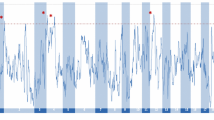Abstract
Purpose
Several genes have been recognized, when mutated in the germline, to highly predispose to colorectal cancer, impairing the DNA mismatch repair system in hereditary nonpolyposis colon cancer syndrome, or APC/MYH in adenomatous polyposis. However, 10 percent of microsatellite stable colorectal cancer is reported to develop in an unexplained context of genetic predisposition. This study was designed to depict the genetic mechanisms underlying early-onset microsatellite stable colon cancers.
Methods
Patients younger than aged 50 years undergoing primary surgical resection for colon carcinoma were collected prospectively between 1993 and 2003. A first series of 8 samples has been allelotyped using 361 poly–CA polymorphisms distributed on the 39 autosomal arms within a larger set of 166 sporadic tumors. Genotyping of 24 poly–CA polymorphisms distributed on the 8 chromosomes exhibiting allelic losses in more than 30 percent of the previous cases was then applied to an independent series of 40 tumors. A third series of 70 tumors has been genotyped on chromosome 14 only.
Results
Comparison of genomic profile from patients younger and older than aged 50 years at the 8 most frequently lost chromosomes allowed, identify chromosome 14 as showing a significant difference between the two groups. Dense chromosome 14 genotyping detected two partial deletions in a general background of 57 percent allelic loss, pointing at a region located between D14S63 and D14S292.
Conclusions
These observations suggest that a tumor-suppressor gene located on chromosome 14 might have an important role in microsatellite stable colon carcinogenesis. Because it seems to be more frequently involved in early-onset cases, it could be a good candidate in inherited conditions.

Similar content being viewed by others
References
Gryfe R, Swallow C, Bapat B, Redston M, Gallinger S, Couture J. Molecular biology of colorectal cancer. Curr Probl Cancer 1997;21:233–300.
St John DJ, McDermott FT, Hopper JL, Debney EA, Johnson WR, Hughes ES. Cancer risk in relatives of patients with common colorectal cancer. Ann Intern Med. 1993;118:785-0.
Rovella V, Carrara S, Cogliandolo S, et al. Familial microsatellite-stable non-polyposis colorectal cancer: incidence and characteristics in a clinic-based population. Ann Oncol 2001;12:813-.
Jenkins MA, Baglietto L, Dite GS, et al. After hMSH2 and hMLH1-what next? Analysis of three-generational, population-based, early-onset colorectal cancer families. Int J Cancer 2002;102:166-1.
Schiemann U, Muller-Koch Y, Gross M, et al. Extended microsatellite analysis in microsatellite stable, MSH2 and MLH1 mutation-negative HNPCC patients: genetic reclassification and correlation with clinical features. Digestion 2004;69:166-6.
Durno C, Aronson M, Bapat B, Cohen Z, Gallinger S. Family history and molecular features of children, adolescents, and young adults with colorectal carcinoma. Gut 2005;54:1146-0.
Zeitoun G, Buecher B, Bayer J, Tanguy ML, Thomas G, Olschwang S. Retention of chromosome arm 5q in stage II colon cancers identifies 83 percent of liver metastasis occurrences. Gene Chromosom Cancer 2006;45:94–102.
Boige V, Laurent-Puig P, Fouchet P, et al. Concerted non-syntenic allelic losses in hyperploid hepatocellular carcinoma as determined by a high-resolution allelotype. Cancer Res 1997;57:1986-0.
Vogelstein B, Fearon ER, Kern SE, et al. Allelotype of colorectal carcinomas. Science 1989;244:207-1.
Solomon E, Voss R, Hall V, et al. Chromosome 5 allele loss in human colorectal carcinomas. Nature 1987;328:616-.
Ashton-Rickardt PG, Dunlop MG, Nakamura Y, et al. High frequency of APC loss in sporadic colorectal carcinoma due to breaks clustered in 5q21-2. Oncogene 1989;4:1169-4.
Muleris M, Delattre O, Olschwang S, et al. Cytogenetic and molecular approaches of polyploidization in colorectal adenocarcinomas. Cancer Genet Cytogenet 1990;44:107-8.
Chan TL, Curtis LC, Leung SY, et al. Early-onset colorectal cancer with stable microsatellite DNA and near-diploid chromosomes. Oncogene 2001;20:4871-.
Hawkins NJ, Tomlinson I, Meagher A, Ward RL. Microsatellite-stable diploid carcinoma: a biologically distinct and aggressive subset of sporadic colorectal cancer. Br J Cancer 2001;84:832-.
Liang JT, Huang KC, Cheng AL, Jeng YM, Wu MS, Wang SM. Clinicopathological and molecular biological features of colorectal cancer in patients less than 40 years of age. Br J Surg 2003;90:205-4.
Young J, Leggett B, Ward M, et al. Frequent loss of heterozygosity on chromosome 14 occurs in advanced colorectal carcinomas. Oncogene 1993;8:671-.
Thorstensen L, Qvist H, Nesland JM, Giercksky KE, Lothe RA. Identification of two potential suppressor gene regions on chromosome arm 14q that are commonly lost in advanced colorectal carcinomas. Scand J Gastroenterol 2001;36:1327-1.
Al-Mulla F, Behnehani AI, Bitar MS, Varadharaj G, Going JJ. Genetic profiling of stage I and II colorectal cancer may predict metastatic relapse. Mod Pathol 2006;19:648-8.
Weber TK, Conroy J, Keitz B, et al. Genome-wide allelotyping indicates increased loss of heterozygosity on 9p and 14q in early age of onset colorectal cancer. Cytogenet Cell Genet 1999;86:142-.
Bando T, Kato Y, Ihara Y, Yamagishi F, Tsukada K, Isobe M. Loss of heterozygosity of 14q32 in colorectal carcinoma. Cancer Genet Cytogenet 1999;111:161-.
Djureinovic T, Skoglund J, Vandrovcova J, et al. A genome wide linkage analysis in Swedish families with hereditary non-familial adenomatous polyposis/non-hereditary non-polyposis colorectal cancer. Gut 2006;55:362-.
Acknowledgment
The authors thank Christel Condroyer for assistance.
Author information
Authors and Affiliations
Corresponding author
Additional information
Supported by Ligue Nationale Contre le Cancer, Association pour la Recherche contre le Cancer and Assistance Publique-Hôpitaux de Paris.
Reprints are not available.
About this article
Cite this article
Mourra, N., Zeitoun, G., Buecher, B. et al. High Frequency of Chromosome 14 Deletion in Early-Onset Colon Cancer. Dis Colon Rectum 50, 1881–1886 (2007). https://doi.org/10.1007/s10350-007-9040-3
Received:
Accepted:
Published:
Issue Date:
DOI: https://doi.org/10.1007/s10350-007-9040-3




